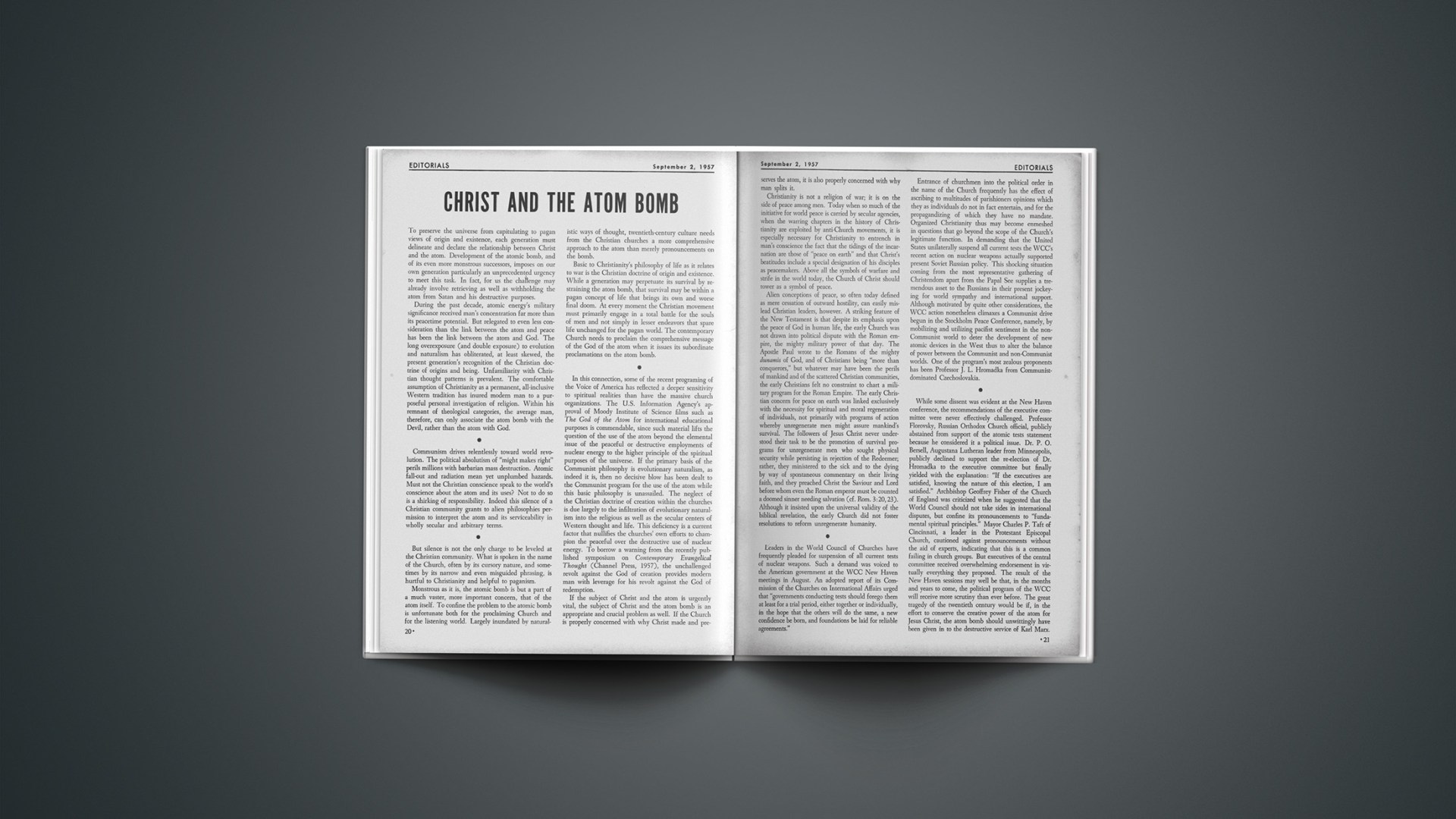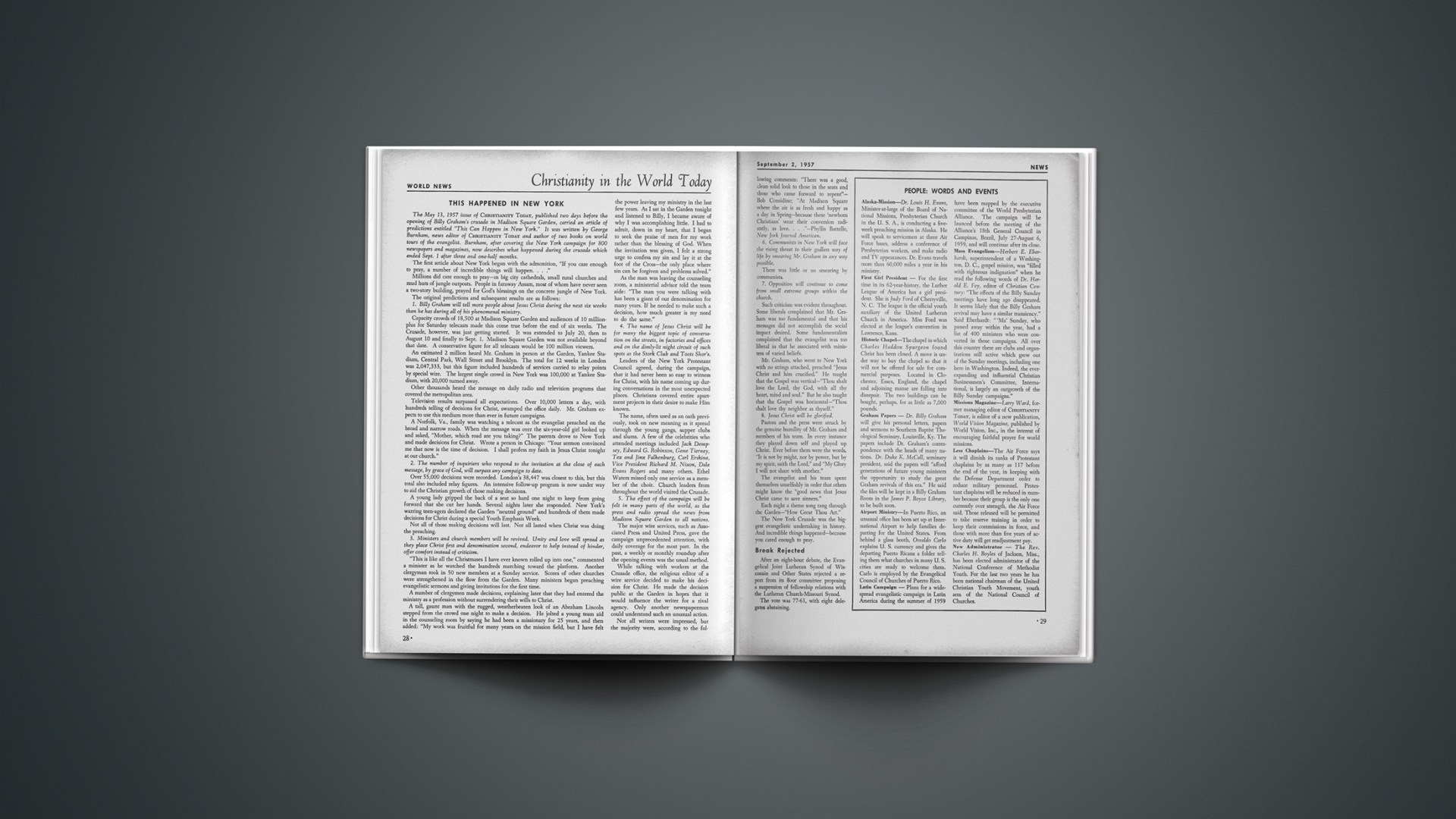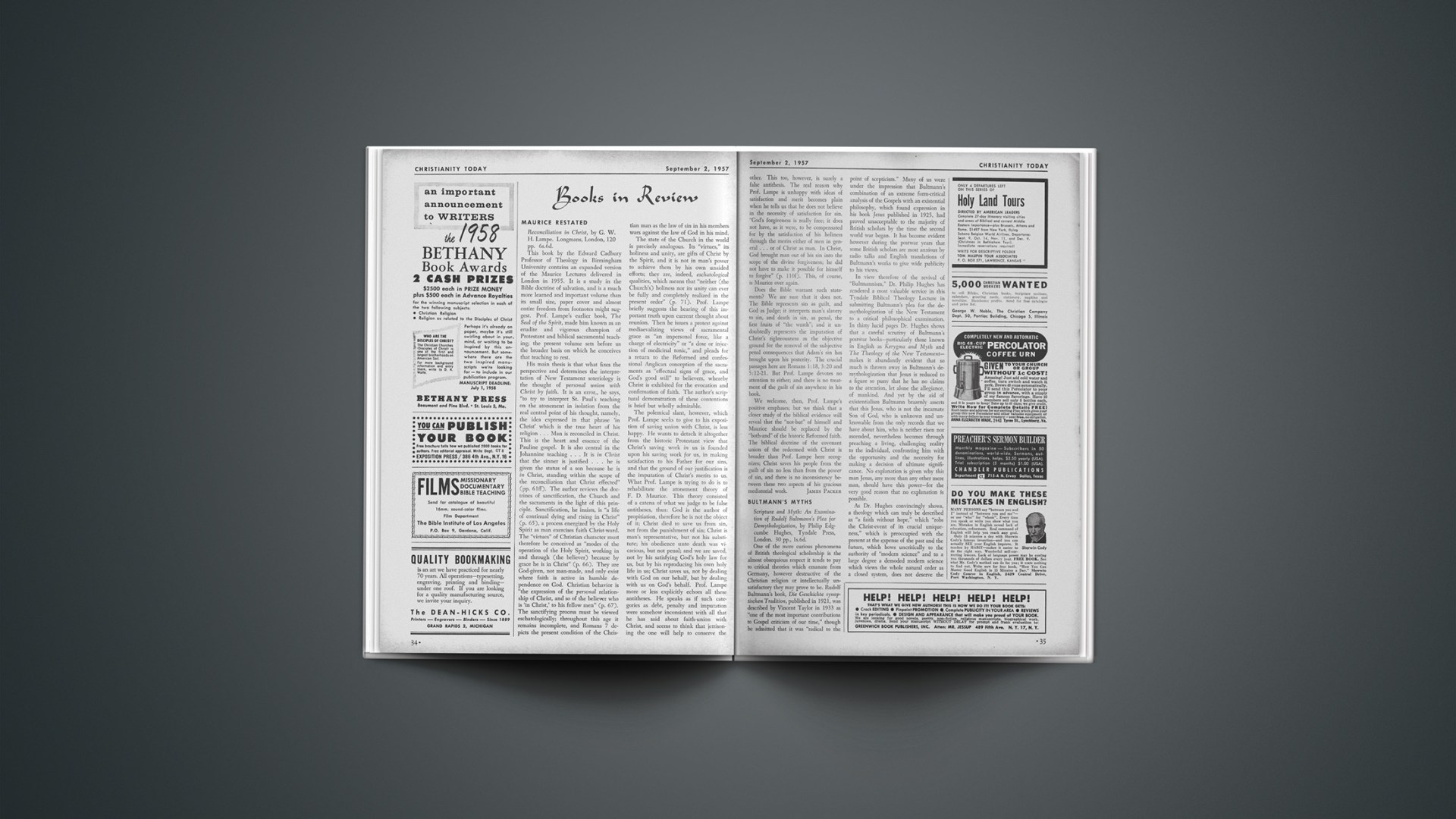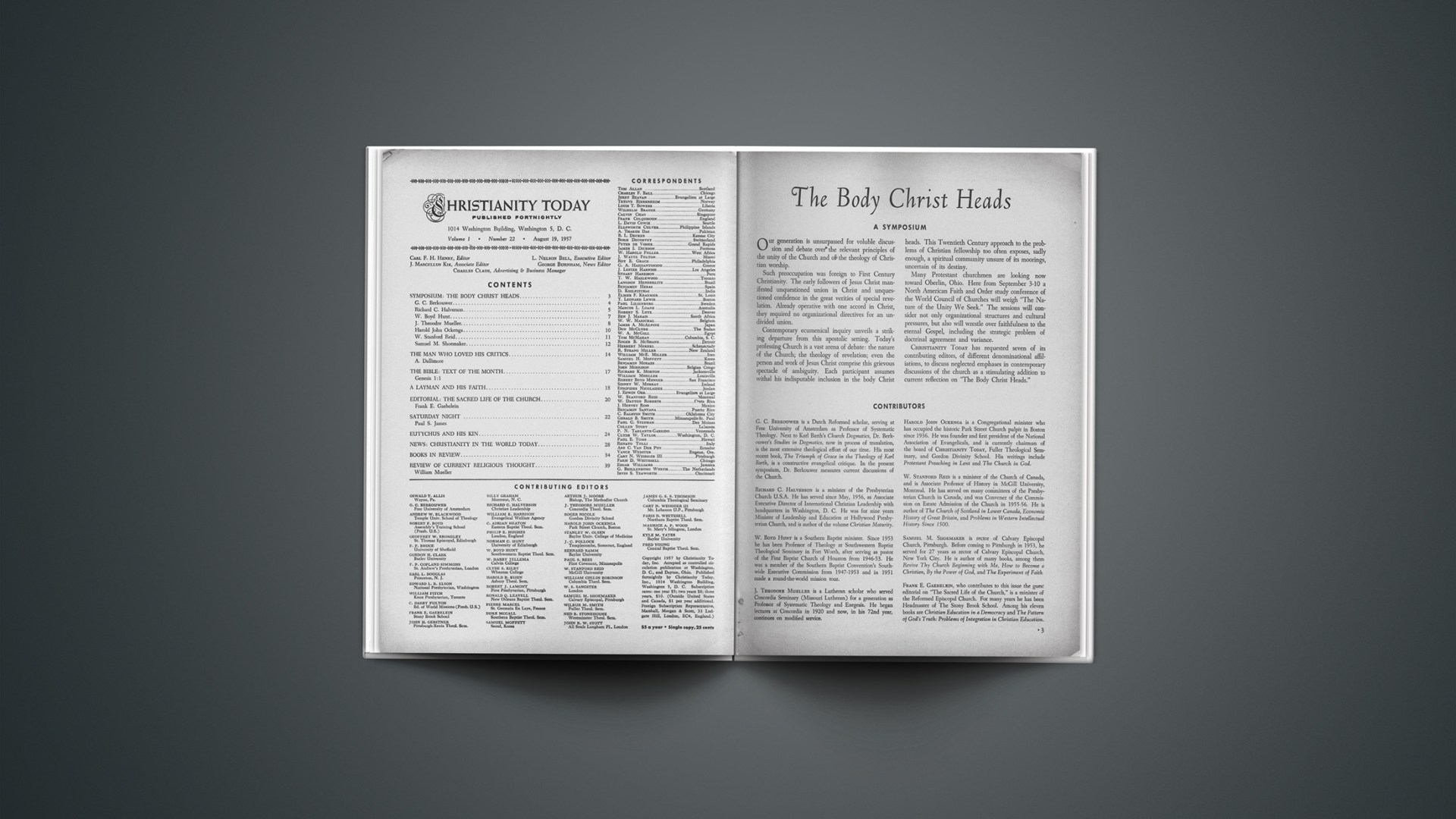To preserve the universe from capitulating to pagan views of origin and existence, each generation must delineate and declare the relationship between Christ and the atom. Development of the atomic bomb, and of its even more monstrous successors, imposes on our own generation particularly an unprecedented urgency to meet this task. In fact, for us the challenge may already involve retrieving as well as withholding the atom from Satan and his destructive purposes.
During the past decade, atomic energy’s military significance received man’s concentration far more than its peacetime potential. But relegated to even less consideration than the link between the atom and peace has been the link between the atom and God. The long overexposure (and double exposure) to evolution and naturalism has obliterated, at least skewed, the present generation’s recognition of the Christian doctrine of origins and being. Unfamiliarity with Christian thought patterns is prevalent. The comfortable assumption of Christianity as a permanent, all-inclusive Western tradition has inured modern man to a purposeful personal investigation of religion. Within his remnant of theological categories, the average man, therefore, can only associate the atom bomb with the Devil, rather than the atom with God.
Communism drives relentlessly toward world revolution. The political absolutism of “might makes right” perils millions with barbarian mass destruction. Atomic fall-out and radiation mean yet unplumbed hazards. Must not the Christian conscience speak to the world’s conscience about the atom and its uses? Not to do so is a shirking of responsibility. Indeed this silence of a Christian community grants to alien philosophies permission to interpret the atom and its serviceability in wholly secular and arbitrary terms.
But silence is not the only charge to be leveled at the Christian community. What is spoken in the name of the Church, often by its cursory nature, and sometimes by its narrow and even misguided phrasing, is hurtful to Christianity and helpful to paganism.
Monstrous as it is, the atomic bomb is but a part of a much vaster, more important concern, that of the atom itself. To confine the problem to the atomic bomb is unfortunate both for the proclaiming Church and for the listening world. Largely inundated by naturalistic ways of thought, twentieth-century culture needs from the Christian churches a more comprehensive approach to the atom than merely pronouncements on the bomb.
Basic to Christianity’s philosophy of life as it relates to war is the Christian doctrine of origin and existence. While a generation may perpetuate its survival by restraining the atom bomb, that survival may be within a pagan concept of life that brings its own and worse final doom. At every moment the Christian movement must primarily engage in a total battle for the souls of men and not simply in lesser endeavors that spare life unchanged for the pagan world. The contemporary Church needs to proclaim the comprehensive message of the God of the atom when it issues its subordinate proclamations on the atom bomb.
In this connection, some of the recent programing of the Voice of America has reflected a deeper sensitivity to spiritual realities than have the massive church organizations. The U.S. Information Agency’s approval of Moody Institute of Science films such as The God of the Atom for international educational purposes is commendable, since such material lifts the question of the use of the atom beyond the elemental issue of the peaceful or destructive employments of nuclear energy to the higher principle of the spiritual purposes of the universe. If the primary basis of the Communist philosophy is evolutionary naturalism, as indeed it is, then no decisive blow has been dealt to the Communist program for the use of the atom while this basic philosophy is unassailed. The neglect of the Christian doctrine of creation within the churches is due largely to the infiltration of evolutionary naturalism into the religious as well as the secular centers of Western thought and life. This deficiency is a current factor that nullifies the churches’ own efforts to champion the peaceful over the destructive use of nuclear energy. To borrow a warning from the recently published symposium on Contemporary Evangelical Thought (Channel Press, 1957), the unchallenged revolt against the God of creation provides modern man with leverage for his revolt against the God of redemption.
If the subject of Christ and the atom is urgently vital, the subject of Christ and the atom bomb is an appropriate and crucial problem as well. If the Church is properly concerned with why Christ made and preserves the atom, it is also properly concerned with why man splits it.
Christianity is not a religion of war; it is on the side of peace among men. Today when so much of the initiative for world peace is carried by secular agencies, when the warring chapters in the history of Christianity are exploited by anti-Church movements, it is especially necessary for Christianity to entrench in man’s conscience the fact that the tidings of the incarnation are those of “peace on earth” and that Christ’s beatitudes include a special designation of his disciples as peacemakers. Above all the symbols of warfare and strife in the world today, the Church of Christ should tower as a symbol of peace.
Alien conceptions of peace, so often today defined as mere cessation of outward hostility, can easily mislead Christian leaders, however. A striking feature of the New Testament is that despite its emphasis upon the peace of God in human life, the early Church was not drawn into political dispute with the Roman empire, the mighty military power of that day. The Apostle Paul wrote to the Romans of the mighty dunamis of God, and of Christians being “more than conquerors,” but whatever may have been the perils of mankind and of the scattered Christian communities, the early Christians felt no constraint to chart a military program for the Roman Empire. The early Christian concern for peace on earth was linked exclusively with the necessity for spiritual and moral regeneration of individuals, not primarily with programs of action whereby unregenerate men might assure mankind’s survival. The followers of Jesus Christ never understood their task to be the promotion of survival programs for unregenerate men who sought physical security while persisting in rejection of the Redeemer; rather, they ministered to the sick and to the dying by way of spontaneous commentary on their living faith, and they preached Christ the Saviour and Lord before whom even the Roman emperor must be counted a doomed sinner needing salvation (cf. Rom. 3:20, 23). Although it insisted upon the universal validity of the biblical revelation, the early Church did not foster resolutions to reform unregenerate humanity.
Leaders in the World Council of Churches have frequently pleaded for suspension of all current tests of nuclear weapons. Such a demand was voiced to the American government at the WCC New Haven meetings in August. An adopted report of its Commission of the Churches on International Affairs urged that “governments conducting tests should forego them at least for a trial period, either together or individually, in the hope that the others will do the same, a new confidence be born, and foundations be laid for reliable agreements.”
Entrance of churchmen into the political order in the name of the Church frequently has the effect of ascribing to multitudes of parishioners opinions which they as individuals do not in fact entertain, and for the propagandizing of which they have no mandate. Organized Christianity thus may become enmeshed in questions that go beyond the scope of the Church’s legitimate function. In demanding that the United States unilaterally suspend all current tests the WCC’s recent action on nuclear weapons actually supported present Soviet Russian policy. This shocking situation coming from the most representative gathering of Christendom apart from the Papal See supplies a tremendous asset to the Russians in their present jockeying for world sympathy and international support. Although motivated by quite other considerations, the WCC action nonetheless climaxes a Communist drive begun in the Stockholm Peace Conference, namely, by mobilizing and utilizing pacifist sentiment in the non-Communist world to deter the development of new atomic devices in the West thus to alter the balance of power between the Communist and non-Communist worlds. One of the program’s most zealous proponents has been Professor J. L. Hromadka from Communist-dominated Czechoslovakia.
While some dissent was evident at the New Haven conference, the recommendations of the executive committee were never effectively challenged. Professor Florovsky, Russian Orthodox Church official, publicly abstained from support of the atomic tests statement because he considered it a political issue. Dr. P. O. Bersell, Augustana Lutheran leader from Minneapolis, publicly declined to support the re-election of Dr. Hromadka to the executive committee but finally yielded with the explanation: “If the executives are satisfied, knowing the nature of this election, I am satisfied.” Archbishop Geoffrey Fisher of the Church of England was criticized when he suggested that the World Council should not take sides in international disputes, but confine its pronouncements to “fundamental spiritual principles.” Mayor Charles P. Taft of Cincinnati, a leader in the Protestant Episcopal Church, cautioned against pronouncements without the aid of experts, indicating that this is a common failing in church groups. But executives of the central committee received overwhelming endorsement in virtually everything they proposed. The result of the New Haven sessions may well be that, in the months and years to come, the political program of the WCC will receive more scrutiny than ever before. The great tragedy of the twentieth century would be if, in the effort to conserve the creative power of the atom for Jesus Christ, the atom bomb should unwittingly have been given in to the destructive service of Karl Marx.
The Christian churches have adequate reason to warn the nations of the world of their moral accountability to the Living God, to condemn the evil of aggressive warfare, to protest the one-sided enlistment of scientific genius to what Pius XII has called a “race toward death,” and to show concern for the well-being of the race in view of the perils of radiation. The Christian community has good reason also to disown a fatalistic view of the inevitability of war, and to emphasize the crucial role of spiritual decision upon the flow of history.
But what mandate do the Christian churches have for instructing any nation that it ought in the name of political righteousness to desist from testing its military defenses? If God wills the state as a political order to promote justice and to restrain injustice in a sinful society, is not a state precondemned to suicide if it is deprived of the right to test its weapons of defense in a century in which one world power, operating on the thesis of state absolutism, makes no pretense of its goal of world revolution?
The usual reply, that a halt must be called in the bomb race because of the vast destructive capacity of nuclear energy, is not decisive. No clear case has been made out for a qualitative difference between nuclear bombs and other weapons of warfare; the difference, however great, remains quantitative. Eliminate the bombs, and terrible though more conventional weapons of war remain. Does the Church bless these? Does it condemn their use under all circumstances also? Is experiment with tactical atomic bombs (limited to battlefields and used against cities only along the front lines of land fighting) approved as moral? Can this qualitative line really be drawn in warfare?
Is not an organization that intrudes into such questions in the name of the Church confused about the weapons of the Church’s warfare? Are we not driven to ask whether behind the WCC action there still lurks the optimistic hope of the now discredited social Gospel of Protestant liberalism, that by the reorganization of unregenerate mankind on ostensibly Christian prinicples a warless world will be inaugurated?
No Christian—indeed, no human being—can fully escape agony of soul over the death-dealing prospect of modern warfare. The Christian churches are rightly driven to assure themselves that they are making their fullest contribution to world peace. But what scriptural license has a resolution to end the testing of the bombs, even for a trial period, as a strategic Christian contribution to world peace? As a venture of political idealism it may perhaps be justified, even perhaps as a military maneuver, but that is a decision which statesmen charged with the destinies of the political order need to make. When Christian churches speak, are they not obliged to stress that man’s only guarantee of survival is his devotion to the commandments by which God judges the race; to stress the connection between the social evils of the world and the master passions of individual life (cf. James 4:1, “From whence come wars … Come they not hence, even of your lusts that war in your members?”); and to stress the contribution to peace made by the regenerating power of the Gospel? Doubtless it is superficial to hold that, in a sinful order, the preaching of the Gospel is the only contribution that Christianity can make to promote world peace. But, if anything, it is superficiality compounded to seek a Christian solution while neglecting the Gospel, and venturing simply to reorganize an unregenerate world order on the basis of romantic idealism.
Progress in disarmament hinges upon a sense of mutual trust among nations. Even unchurched leaders today ask what basis exists for trusting a Communist leadership that acknowledges no objective moral principles, let alone the reality of the Living God and the validity of his commandments. Is not the Gospel the best weapon the Church knows for restoring these dulled spiritual and moral sensitivities?
The Christian community is profoundly right in its warning to the world that nuclear war will provide no solution to world problems, but will bankrupt modern history. But if Christian forces hope to show the way to peace, they had best not concentrate their efforts on dubious vulnerable techniques for avoiding war. Worldly organizations may busy themselves with delaying actions for postponing doom, but the Church’s primary role is to call a new race of men into fellowship with Christ as Lord. The cessation of nuclear bomb tests is no more the world’s real hope for peace in this decade than the organization of the United Nations was in the last. That great hope is Jesus Christ. And it is time professing followers of Christ clarify this hope in a world of peril. The modern man’s one great prospect of peaceful existence in these dark decades lies in the recognition of the lordship of Christ, in the reaffirmation of the Judeo-Christian view of life, and in the dedication of the atom and the atom bomb to the service of righteousness and love.
A Prepared Messenger And His Message
Dr. Robert Munger, pastor of First Presbyterian Church of Berkeley, California, recently said in a workshop for ministers in New York: “A prepared messenger is more important than a prepared message.”
By this Dr. Munger did not mean to minimize the importance of thorough preparation of a sermon from a topical, scriptural and homiletical standpoint. But he did mean that God uses cleansed and filled vessels for his own glory and that a minister who has prepared himself by a complete yielding to Christ in every area of his own personal life and approaches his message from his knees is the one whom God can honor and use.
In these days when so many administrative duties accrue to the minister, when he finds himself under constant pressure to meet pastoral responsibilities, grave danger exists of too little time being left for the most vital part of his life, the spiritual, without which even the most eloquent sermon can become so many empty words.
While it remains the responsibility of the minister to guard and nurture this most important part of his own life, the congregation has a duty to see that he is spared many seemingly important but nonetheless secondary duties. To make this possible the minister will have to say “No” to many requests and to make his position tenable the congregation will have to accept such refusals graciously.
What person would employ a lawyer on a vitally important matter and then expect him to spend his time in social and other activities that mitigate against proper preparation of his case?
Who would ask a surgeon to operate for a serious physical ailment and then expect the surgeon to fritter away his time on secondary matters?
And yet, too many members of the average congregation ask their minister to provide time and services they have no right to expect. Or how often a minister may himself take time and energy for things that deaden or lessen spiritual awareness and power.
The Christian ministry is a desperately serious matter for it has to do with matters of eternal import. The preacher of the Gospel stands as a link between the living and the dead, between men who are in darkness and despair and a Way which brings light and joy. “Be ye clean, that bear the vessels of the Lord” is an admonition found in Isaiah. This envisions a minister of the Lord cleansed for his task. “Be filled with the Spirit” Paul exhorts us, an indication of the source of spiritual power.
Prepare your message? By all means, but never forget that for the message there must also be a prepared messenger.
END












